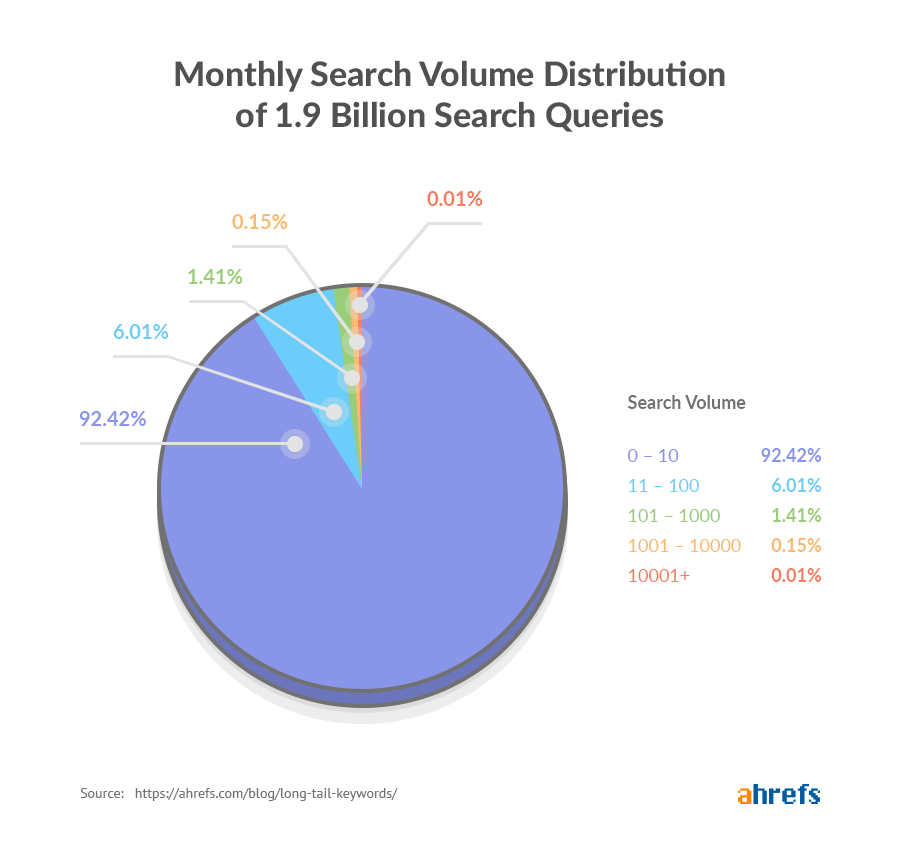How to Earn Leads from Your Real Estate Blog | 2023
Step 1: Get a real estate license.
Step 2: Start a blog
Step 3: Profit!
Right?
It’s the Underpants Gnome logic of making money!
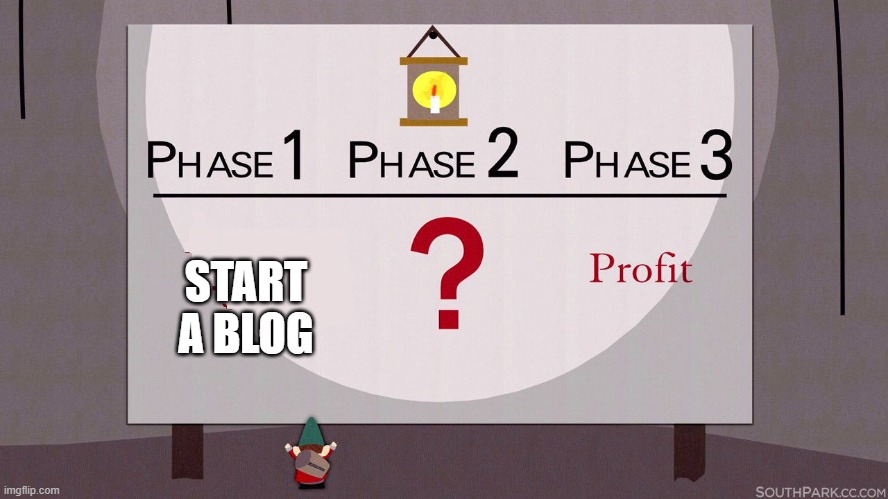
When I started in real estate, it was just assumed that you must have a blog. It wasn’t even a question.
Every agent in the office had a website and at least a couple 300-word “articles” in a tab marked “Blog”.
Most of them don’t earn a dime from their blog. Or even their entire website. There are just as many reasons to not have a blog as there are reasons to. Before you waste your time attempting a blog, make sure it is right for you, your business, your personal style, and your goals.

Pros and Cons of Blogging
Don’t blog because you think you have to. Only do it if you are committed to being at least one of the 10 best bloggers in your city. Otherwise, pick a different lead gen strategy.
Here’s what to weigh before deciding on blogging as your lead generation strategy of choice.
Pros
- Passive Lead Generation. Your blog can be evergreen content that works for you when you’re sleeping. A page ranking on Google is earning for you without your spending a dime.
- Cheap to Get Started. A website is very cheap if you are willing to DIY. There are very few recurring expenses.
- Warm Leads. A well-written blog will make you an authority in your space, begins earning trust, and even can close the deal before you’ve ever even know your customer’s name!
- Easy to Multi-Purpose. Blog content is a great foundation to begin a multi-channel marketing effort. You can repurpose your blog into a video, podcast, infographic, and share it on social media or an email marketing newsletter. Eventually, you can even monetize it in other ways like your own little media company (think Curbed or Brick Underground).
- Non-Confrontational. Perhaps the best thing about blogs is that it is one of the friendliest ways to sell yourself. No hard closes. No dialing for dollars. You attract business instead of hunting and killing it, perfect for introverts. This is called inbound marketing, attraction marketing, or just content marketing.
Cons
- Takes Time. Google generally is wary of strangers, and a new blog will take time to earn its trust and build a library of content that will start turning in leads. I would recommend 12-18 months before you should expect meaningful traffic from your site.
- Expensive to Outsource. While blogs are dirt cheap to DIY, they are quite expensive to outsource and still maintain the kind of quality you need to see results. That can become an obstacle to scaling.
- Difficult to Research. Keyword research for local businesses can be tricky. Long tail hyper-local keywords don’t have many monthly searches and it can be difficult to tell which topics you should prioritize. That can make keyword research hit or miss.
- All in or Bust. There are only 10 spots on the first page of Google. That means you need to have top 10 content in your market. If you cannot do that, it’s probably not worth your time and money.
If these don’t appeal to you or your style, consider and compare it to other lead generation strategies.

How to Start a Real Estate Blog
Before starting a blog, you need to build your house on the right foundation.
Your foundation is your website.
How to choose and set up a website is beyond the scope of this guide. But it’s important to do an inventory of what website you are using and ensure it is a good foundation for SEO.
It does you no good to build traffic to a website that you are going to lose if you switch providers, or they change their terms, or you change brokers.
As a general rule, I recommend using sites that are built on WordPress for blogging. Or, you can build your own WordPress site reasonably easily without any technical knowledge at all!
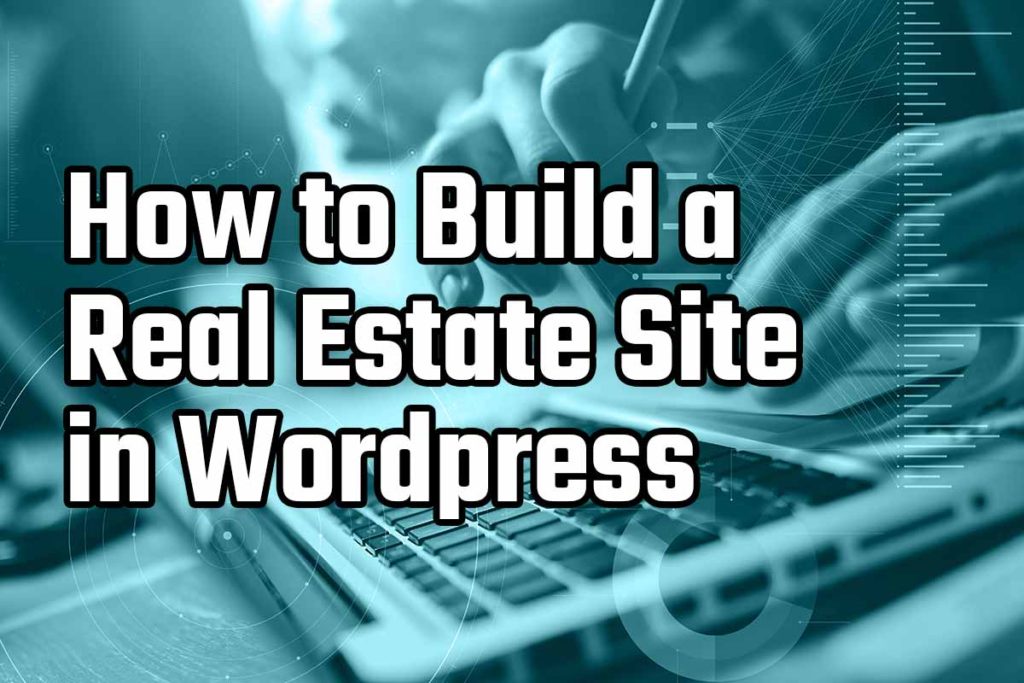

There are three exceptions to the WordPress rule, however. I’ve seen the following three website providers get good SEO results for the real estate professionals that use them and are worthy of consideration depending on your budget:
Sites I generally don’t recommend using to blog include many of the big platforms, many of which are focused on conversion, buyer search, and your funnel, and not so much ranking on Google for organic traffic.
These sites may make for good lead generation or brand websites. But you want a website optimized for the third type of real estate website: content.

Content websites are content-rich, don’t force registration, and encourage visitors to explore and spend time on the site.
First Steps
So you have a new blog! Here are some important steps to consider in order to start getting traction:
- Ensure you’ve started a Google Analytics account and submitted your sitemap.
- Consider looking for guest posting opportunities to earn backlinks and recognition for your blog.
- Set up or update your Google My Business account.
- Begin citation building in relevant and local business directories.
Best Realtor SEO Keywords
SEO stands for “search engine optimization”. It is the study and execution of the best practices that will get your website to show up on Google searches. The Google algorithm is a closely guarded secret, and there is an entire SEO industry whose sole purpose is to guess at what it is and optimize their sites for it.
So, how does one get on the first page of Google? Zillow, Realtor.com, and Coldwell Banker already have all those spots taken, right?
Sure, for the tougher keywords like “[your city] homes for sale” (though I’ve seen agents break onto page 1 for that keyword, too).
Instead, you’ll want to target lower volume long tail keywords. Fortunately, these make up most searches. Over 90% of search terms have fewer than 10 searches a month.
The nice things about long tail keywords is they may get less traffic but are easier to rank for. In fact, sometimes short 300-500 word articles, narrowly targeted, can rank successfully for keywords that are relevant to your local market.
Short articles about local neighborhoods and local builders can easily get high-intent buyer and sellers onto your site.
What to Write About
I wrote a post on keywords I have successfully ranked near the top of Google in the past. Keyword categories include:
- Neighborhood names
- Local builder names
- Local real estate categories (e.g. HOAs, pool homes, condos, etc)
- Contracts (e.g. “seller’s disclosure”)
- [your city] + [loan type] (e.g. “Killeen USDA loan”)
- MLS statistics (e.g. “[your city] + real estate market”) and updates on market trends
- Local places and events
- Transaction steps (e.g. “[your city] home inspections”)
- Buyer niches (e.g. “[your city] + investors”)
- Local vendors (e.g. “[your city] + lenders”)
- Housing market updates
- Information for local real estate investors
- Opinion pieces about industry news
Between those 10 alone there are over 1000 articles and pages I could easily write, each one of which would likely deliver a few visitors to my site every month. That adds up fast!
Especially helpful is that many of these articles are evergreen. The local park article will probably be current for 5 years or more before you need to update it.
Blogging KPIs to Target
Measuring your progress is free!
Link your site to Google Analytics on Day 1. There, you will be able to monitor a tremendous amount of information, tracking your most popular pages, traffic sources, and more. You can even set up conversion tracking.
I personally track organic unique users. I look at my most popular pages and ensure those pages are optimized and look good.
If you are super nerdy, there is a great channel on YouTube called MeasureSchool. It has lots of tips on how to geek out in Google Analytics, split test, optimize, and do all sorts of stuff if you want to overthink your website.
My recommendation is to not overthink it. Google’s goal is to reward good content. You already are naturally in a niche because you are writing about hyperlocal real estate. Your competition (for long-tail keywords, at least) is not major branded publishers and SEO powerhouses. Build good content and the audience will come.
Blogging Tips for Realtors
- Don’t Outsource Until You’re Successful. Creating content takes a lot of time. When you finally see success, time is the one thing you don’t have. While some might be tempted to skip the time investment and start outsourcing right away, you risk sinking a lot of money into an unproven lead generation source. Do it yourself first. Create successful examples that achieve your goal, and then use these examples to train your future hirees.
- Not all about SEO. You can repurpose content to provide to your clients (e.g. “What to expect during the home inspection”). Or instead of targeting Google, you can target social media with a viral click-baity piece of content. You can even ride the wave of current events for content inspiration, though that content is usually not “evergreen” and has a short shelf life.
- 1000+ Words. With the possible exceptions of neighborhood pages and builder pages, you need to be aiming for at least 1000 words in each of your blog posts. Google is rewarding longer blog posts. The $20 300-word post from 2009 doesn’t cut it anymore.

Examples of Successful Real Estate Blogs
The Denver Ear
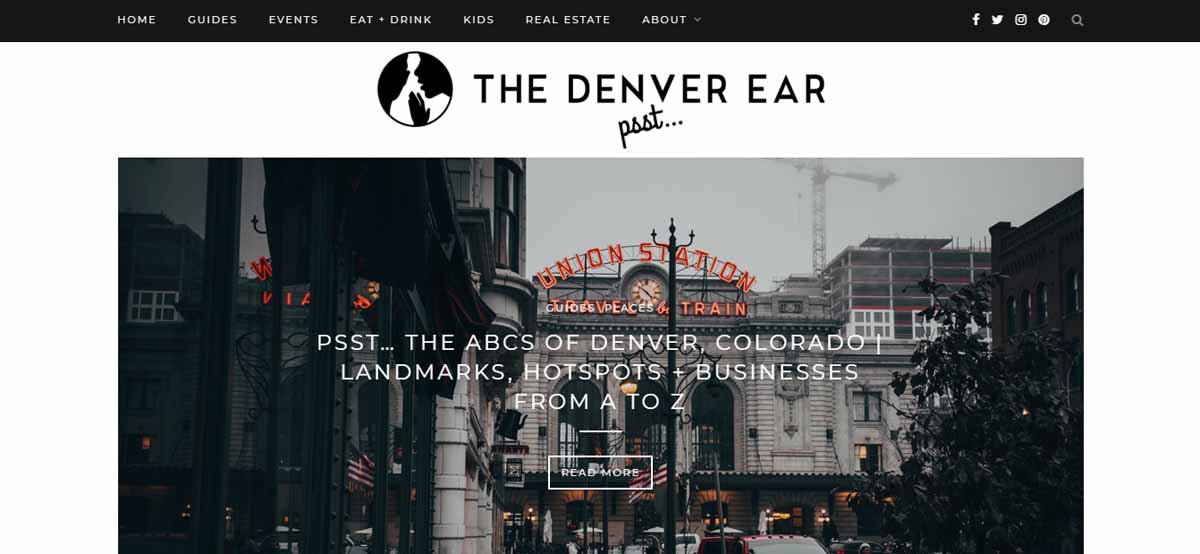
Mor Zucker is a real estate agent in Denver, Colorado, and has fully embraced the “content site” concept. Their top-performing page at this moment is an article about jazz clubs!
The Denver Ear is all about Denver, the community, things to do, and more. It is separate from her real estate website which is focused on real estate services, but prominently includes a link in the header to point people in that direction.
They have a clever headline trick of including “psst” at the beginning of each article, playing on the idea that they are sharing the rumors and inside scoops of a true Denver local. Mor has been honored by RIS Media, and has spent time on stage presenting at Inman
Maximum Real Estate Exposure
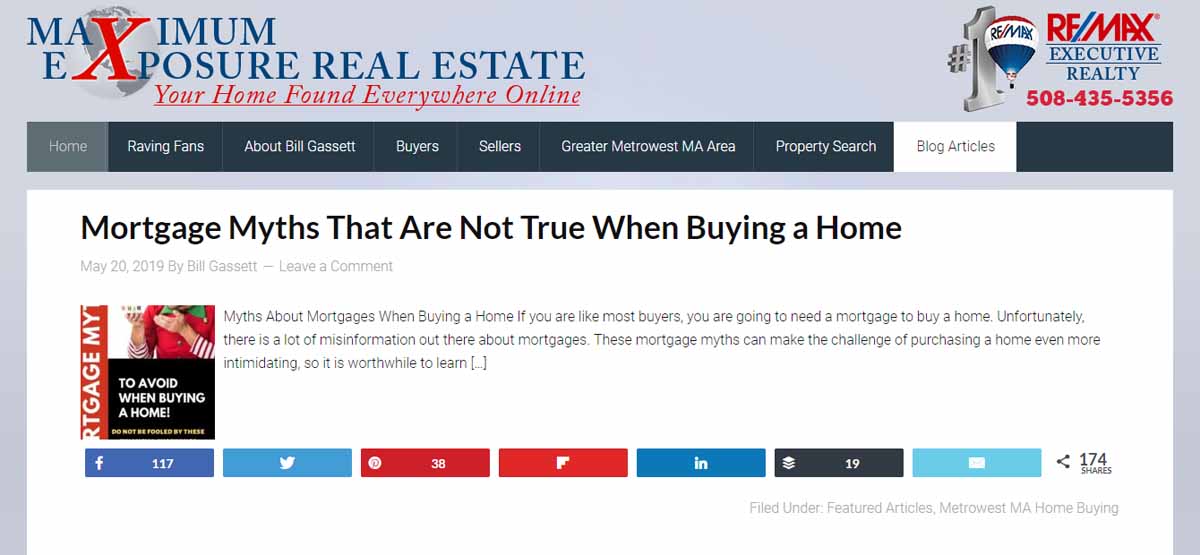
Bill Gassett is the grandmaster of real estate blogging. It seems his name comes up just about everywhere if you spend more than five minutes researching real estate blogging online.
He is a moderator on the Facebook group Real Estate Bloggers – A Group Designed To Help Promote Helpful RE Content!
I’d argue one of Bill’s top strengths is in guest posting. You will find nuggets of wisdom, interviews, and articles from him all over the web (and every one with a backlink pointing back to his website).
His site itself is a little bit dated, with an aesthetic that is still firmly grounded in the late 2000s of web design. But that is just further proof that blogging works. You don’t need a fancy website to make to work. Great content is enough.
Rochester Real Estate Blog
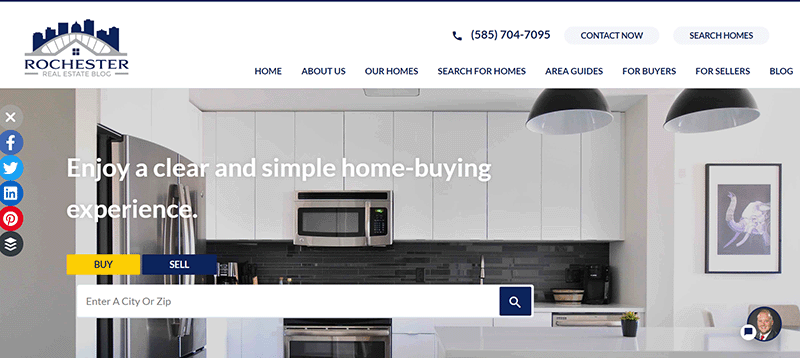
The founder of the aforementioned real estate blogging group on Facebook is Kyle Hiscock, owner of the Rochester Real Estate Blog.
Their blog features a strong smattering of articles that rank for national audiences and also hyperlocal content catering to his local community (and with likely a higher commercial value).
Their Easy Agent Pro website is crisp and fun and chock full of blog content. I like the flat design that makes for easy reading, and the bold call-to-actions that is the hallmark of “EAP” websites.
Ruby Home

RubyHome.com is the content site for Tony Mariotti, a Los Angeles agent who got his start in the tech world.
Tony owns two other sites at Luxury Homes Los Angeles and Great Vancouver Homes, both of which also get 5 digits worth of organic monthly traffic. He is a team with another agent in Vancouver. Tony does the website and marketing, the other agent shows and sells homes!
Tony apparently loves writing and content generation and his family of websites is definitely worth diving into!
Others
I found a list of 16.5 blogs that agents have built and are ranking on Google that I recommend checking out for inspiration.

Resources and Training
Remember, here at Hooquest, I believe in spending as little money as possible. I don’t recommend purchasing coaching, training, or advertising until your business is already working. Especially with blogging, you can easily trade time for money and get far with minimal investment. But it can cost a lot if you outsource the content, often without and proven results.
YouTube Training
Online Publications
If you’re diving into content marketing and SEO, I recommend getting started by consuming content from the following online sources:
- SearchEngineJournal
- SearchEngineLand
- Authority Hacker
- BrightLocal
- Moz
- Content Marketing Institute
- HubSpot Blog
- Neil Patel
If you’re super into it, Moz, HubSpot, and the Content Marketing Institute all have annual conventions for “inbound” content marketers.
Podcast Episodes
If you are interested in content marketing and blogging, I recommend checking out the podcasts at:
The following are some podcast episodes featuring Realtors talking about their blogging tips and tricks in our industry.
- Real Estate Marketing Dude: SEO Isn’t Dead with Kris Reid
- GSD Mode: Top Realtor uses SEO & Organic Leads To DOMINATE His Market | GSD Mode Podcast with Tyler Ford
- The HyperFast Agent Podcast. Episode #222 Generate Leads Forever With Evergreen Content with Trevor Mauch
- Pat Hiban / Real Estate Rockstars: 609: CONTENT MARKETING 101: THE BEST WAYS TO MARKET YOUR BUSINESS ONLINE WITH LYNDSAY PHILLIPS
- Real Estate Titans: Real Estate Titans, hosted by Greg Fowler. Special guest Mor Zucker.
- Massive Agent Podcast: WHAT IT TAKES TO BECOME A LOCAL MEDIA COMPANY- EP 28
- Massive Agent Podcast: HOW CONTENT MARKETING CHANGED MY LIFE: EP 8
- Real Estate Sessions: Episode 223 – Melissa Case, Manager, Social Community, Campaigns and Content at Citrix
Coaches / Training
Lori Ballen

Tools and Software
There is obviously an infinite number of tools and software related to building a website, including forms, WordPress plugins, hosting, IDX, page builders, and more. There are also countless website providers.
Below are just a couple of handpicked tools I’ve used or use that can get the most out of your blogging efforts.

BrightLocal
$29+/mo. BrightLocal has a variety of marketing tools targeting local SEO for small business professionals. Their flagship product includes citation building, Google My Business audits, and reputation management.

SEMRush
$99+/mo. SEMRush is an all-in-one website tool, including tools like a keyword planner, on-page SEO tool, competition research, backlink tracker, and more.

Zapier
Zapier is an integration service that allows different apps, software, and websites to talk to all your other apps, software, and websites. You can set it up to route leads to your CRM, email, and text you, for example. It is an indispensable tool to connecting your entire tech stack.

OptinMonster
OptinMonster is a website add-on that creates elegant pop-ups and forms for capturing leads. Less intrusive than forced registration, they also offer “exit intent” popups and have very flexible rules to conform to how you want to integrate it into your site.
Others
The list of software and tools to help run your blog and website is literally endless.
Some other interesting ones to test out thought would include free software tools (or at least with a free starter plan) like Hotjar (heatmapping) and Ubersuggest (keyword research).

“Done For You” Blogging
If you are an enterprise looking for a managed social media presence, there are social media management companies that can take this all off your plate.
In addition to helping you produce your blog content, many of these companies are also SEO experts.
Below are a few companies that offer a variety of content options, ranging from professional writers to generic content that you can post to your channels.
Keeping Current Matters

The Best Real Estate Writer

Contently
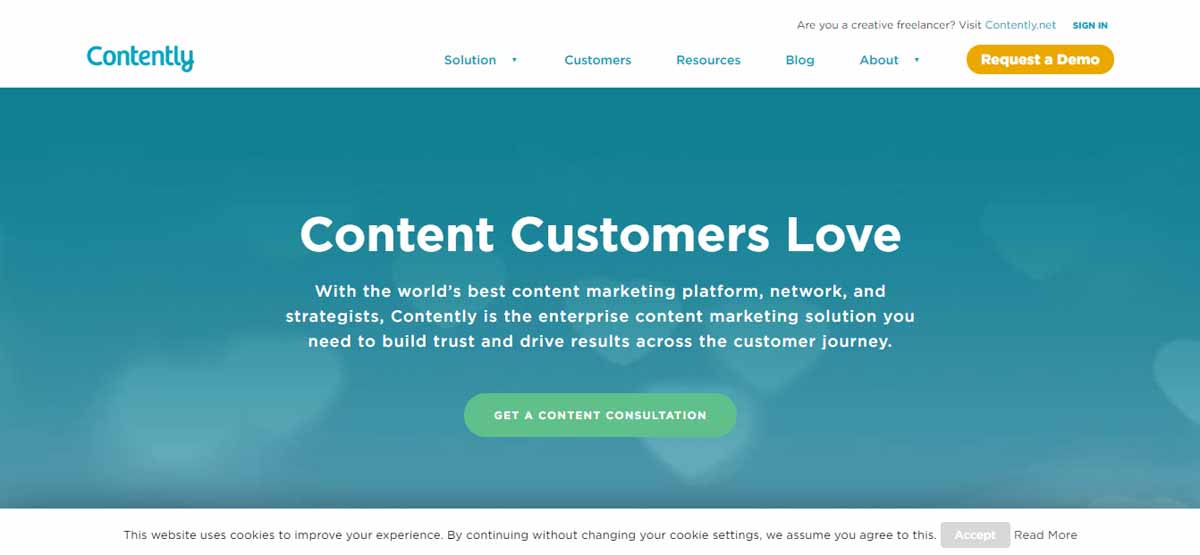
Hypewired
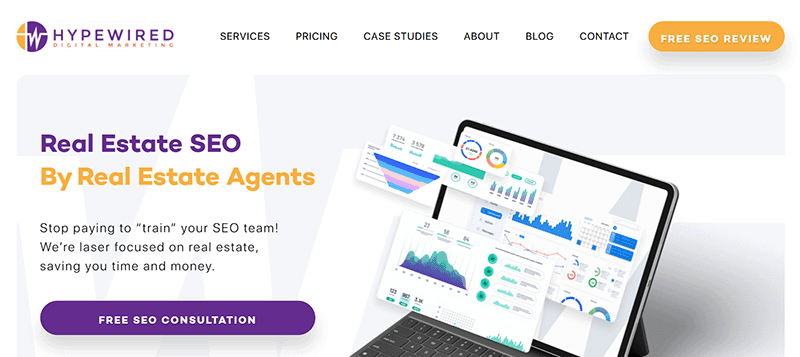

Conclusion
Blogging works.
There are few things sweeter than getting emails from buyers and sellers you’ve never met before who want to use you as their agent because they’ve been following your blog for months or years.
If you are patient, consistent, and enjoy writing quality information that people can use, blogging is a great long-term strategy to build your real estate business foundation.
